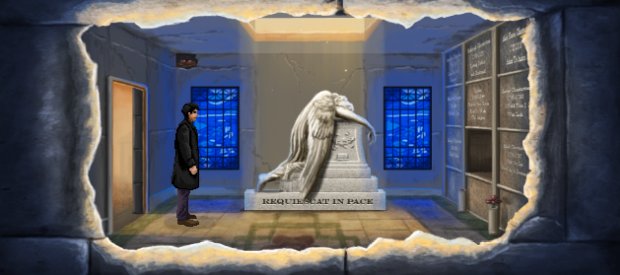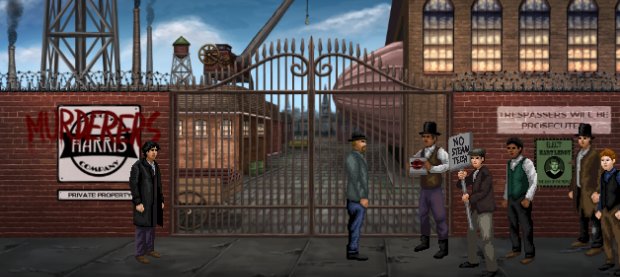Lamplight City promises a detective story where you can screw up everything
Shady tales
After the delights of sci-fi adventure Shardlight we were always going to be interested in what Francisco Gonzalez did next. Now having played a small section of his follow-up, Lamplight City, I can confirm such anticipation is well merited. This is a steampunk detective adventure where messing everything up is an entirely legitimate way to play.
Following the news that Dave Gilbert and Francisco Gonzalez were no longer working together, there were at one point concerns for the future of Lamplight City. Concerns be put aside, because we're in for a treat of a 2018, with not just Gilbert's own RPG-influenced approach to the genre in Unavowed, but also Gonzalez realising his own vision for adapting the traditional point-and-click adventure, in a game he's not only written, but also painted and animated.
Lamplight is a detective story featuring multiple cases for PI Miles Fordham, an ex-cop who's seemingly haunted by his former partner. Set in an alternative version of the 19th century, in the industrially advanced New Bretagne, Fordham's first case seems relatively benign. A flower shop is being routinely broken into, flowers stolen, but then the money to pay for them left inside. The owner refuses to call the police, simply because the situation is so bizarre, so her assistant defies her wishes by getting in a PI. As you might suspect, the case turns sour, someone is killed, and Fordham finds himself muddled in a peculiar mystery while apparently losing his mind.
But what's rather intriguing here is, inspired by the more recent Sherlock Holmes games (in this concept alone, thank goodness), Lamplight makes it possible for you to misinterpret a case's evidence, or miss vital clues, and yet still be able to play. In fact, you can completely fail to solve a case, just mess up a big section of the game entirely, and yet continue on despite this. The game will, says Gonzalez, adapt to your mistakes and play out differently depending upon your successes and failures. It's even possible to so colossally screw everything up that you can not even play the game's climactic chapter, and receive an entirely negative ending instead.
The game also does away with the inventory, which may or may not appeal to you. I was surprised at first, solving a puzzle involving opening a window after realising I needed to find a sharp object that could fit in the hole. When I returned to it with a basket hook from the flower shop, I only needed to click on the window to have it be used. Which, at first, felt odd, until I recognised what a perfunctory act it would have been to use the thing I knew was needed here in the place I knew it was needed. Sure, yes, automate that! Will it diminish later puzzles? We don't yet know, but the game's promise to offer difficulty such that you can be led down entirely incorrect garden paths suggests its complexity will be found elsewhere.
It looks great - the enormously talented Ben Chandler provided the backgrounds and animations for Shardlight, but this time Gonzalez has done it all himself. And gosh, he's multi-talented. The voice acting I saw from the opening chapter is superb too, with the banter between the leads often funny, and always well delivered. What I wasn't able to get an impression of from this preview was how the core game itself will play, how it will feel to get involved in mysteries you might muddle your way out of being able to solve. That's a complicated balance to get right, and I strongly hope Lamplight will find it, because everything else about it is looking so promising.
It's interesting that both Gonzalez and Gilbert have approached replayability in a traditionally one-and-done genre in such different ways. Unavowed opts for multiple solutions to situations, with varying characters and different player backgrounds, while Lamplight City has so much freedom for the player to interpret cases their own way. Both approaches mean the game can be played all over again with different experiences, and perhaps more crucially for smaller indie projects with a narrative focus, it means both remain worth playing after someone's watched a stream of the game. It's fascinating that such excesses are seemingly becoming vital in our Twitchy future.
It's also interesting that the creaky old Adventure Game Studio engine is seeing such fresh life put into it, at the same time as its own improvements mean games can run at higher resolutions with double the pixel count (don't get excited - not modern resolutions, it's just escaped from its previous 640x480 prison).
Lamplight City is due out this summer, and from the snippet I've played, is looking extremely good.





